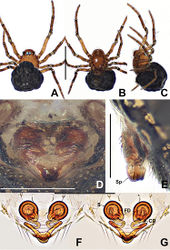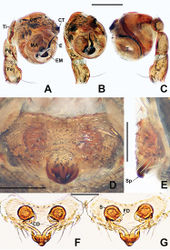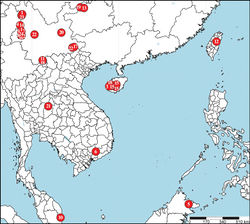Crassignatha thamphra
| Notice: | This page is derived from the original publication listed below, whose author(s) should always be credited. Further contributors may edit and improve the content of this page and, consequently, need to be credited as well (see page history). Any assessment of factual correctness requires a careful review of the original article as well as of subsequent contributions.
If you are uncertain whether your planned contribution is correct or not, we suggest that you use the associated discussion page instead of editing the page directly. This page should be cited as follows (rationale):
Citation formats to copy and paste
BibTeX: @article{Li2020ZooKeys988, RIS/ Endnote: TY - JOUR Wikipedia/ Citizendium: <ref name="Li2020ZooKeys988">{{Citation See also the citation download page at the journal. |
Ordo: Araneae
Familia: Symphytognathidae
Genus: Crassignatha
Name
Crassignatha thamphra Y. Lin & S. Li sp. nov. – Wikispecies link – ZooBank link – Pensoft Profile
Type material
Holotype ♀ (IZCAS-Ar 41035), Thailand: Khon Kaen Province, Phu Pha Man District, Phu Pha Man Subdistrict, Tham Phra Cave (16.66603°N, 101.89623°E; 262 m), 10.XI.2016, H. Zhao, Y. Li and Z. Chen leg.; 1♀ (NHMSU-HA089) used for sequencing, GenBank: MT992003, same data as for preceding.
Diagnosis
This species differs other Crassignatha species, except C. yinzhi, by the copulatory ducts diagonally connected to the copulatory opening and not fused before reaching copulatory opening. It can be easily distinguished from C. yinzhi by the larger spermathecae separated by less than their diameter and the tighter turns of the copulatory ducts at center of the vulva (Fig. 32G vs. Fig. 37G).
Description
Female (holotype). Total length 0.64. Carapace 0.32 long, 0.32 wide, 0.28 high. Clypeus 0.10 high. Sternum 0.20 long, 0.20 wide. Abdomen 0.44 long, 0.48 wide, 0.48 high. Length of legs: I 0.92 (0.28, 0.12, 0.20, 0.16, 0.16); II 0.74 (0.22, 0.10, 0.14, 0.12, 0.16); III 0.64 (0.16, 0.10, 0.12, 0.12, 0.14); IV 0.84 (0.24, 0.12, 0.18, 0.12, 0.18).
Somatic characters (Fig. 32A–C). Coloration: prosoma yellowish brown. Legs dark brownish. Abdomen black with faint, sclerotized dots. Prosoma: carapace nearly pear shaped, surface indistinctly textured. Cephalic area elevated. ALE slightly protruded. PER straight. Chelicerae bears sparse, short setae anteriorly. Labium tongue shaped. Sternum heart shaped, slightly plump, surface smooth, truncated posteriorly. Legs: covered with setae and bristles. Abdomen: abdominal shape irregular and surface rugose (caused by alcohol immersion). Spinnerets weakly sclerotized.
Epigyne (Fig. 32D–G): epigynal area slightly sclerotized, bears a few long setae. Scape protruded, longer slightly than wide. Internal structures faintly visible via translucent tegument. Spermathecae separated by ~ ½ their diameter. Fertilization ducts thin, slender, originating from posteromedial margin of spermathecae, forming a U-shape. Copulatory ducts long, connected to the posterior surface of spermathecae, curving twice below spermathecae, linked diagonally, and fused to copulatory opening.
Male. Unknown.
Etymology
The specific name is derived from the type locality; noun in apposition.
Distribution
Thailand (Fig. 38).
Original Description
- Li, Y; Lin, Y; Li, S; 2020: A review of Crassignatha (Araneae, Symphytognathidae) ZooKeys, 988: 63-128. doi
Images
|


